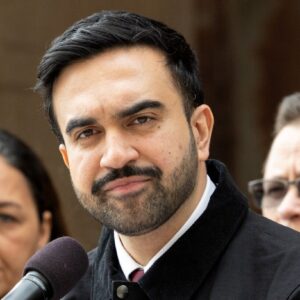
The U.S. Supreme Court is considering whether to hear a case brought by former Kentucky clerk Kim Davis, who is seeking to overturn the court’s decision in Obergefell v. Hodges, a landmark ruling that established the right to same-sex marriage across the nation.
Davis’ attorney, Matthew Staver, expressed optimism about the court taking the case, according to Newsweek.
But William Powell, the attorney who represented the couple that sued Davis, provided a statement to Newsweek that he is “confident the Supreme Court will likewise agree that Davis’s arguments do not merit further attention.”
The case, brought by Davis—a former Kentucky clerk who served six days in jail for refusing to issue marriage licenses to same-sex couples on religious grounds—could pose a significant challenge to federal protections for same-sex marriage nearly a decade after the Supreme Court legalized such unions nationwide.
Some justices, including Clarence Thomas, have signaled a willingness to revisit the issue in recent years, particularly as the court has shifted to the right. That conservative realignment on cultural matters was underscored by the 2022 decision overturning Roe v. Wade, which had guaranteed abortion rights for decades.
If the court were to strike down the nationwide right to same-sex marriage, the matter would likely revert to the states—many of which have yet to pass laws recognizing such unions.
In a newly filed petition to the Supreme Court, Staver argued against same-sex marriage on religious grounds.
“Obergefell was ‘egregiously wrong,’ ‘deeply damaging,’ ‘far outside the bound of any reasonable interpretation of the various constitutional provisions to which it vaguely pointed,’ and set out ‘on a collision course with the Constitution from the day it was decided,’” he wrote.
Davis’ case “presents the ideal opportunity to revisit substantive due process that ‘lacks any basis in the Constitution,’” the petition says, per Newsweek.
“This flawed opinion has produced disastrous results leaving individuals like Davis ‘find[ing] it increasingly difficult to participate in society without running afoul of Obergefell and its effect on other antidiscrimination laws,’” it reads. “And, until the Court revisits its ‘creation of atextual constitutional rights,’ Obergefell will continue to have ruinous consequences for religious liberty.’”
The petition stated that if the court were to overturn Obergefell, the authority to determine marriage rights would revert to the states, while same-sex marriages performed since the ruling would remain legally recognized under a grandfather provision.
Staver told the outlet that he believes the court’s previous ruling on the issue is constitutionally unsound.





